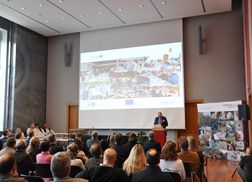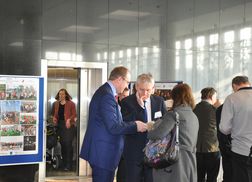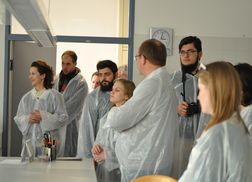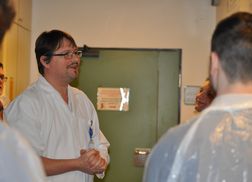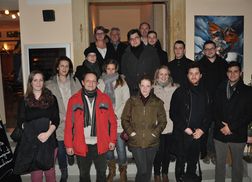CEPI opening event and student exchange
As the first event of the project, ten students of the Georgikon Faculty were hosted by the University Clinic of Poultry and Fish Medicine of Vetmeduni on 19 and 20 January 2017. As part of the professional programmes, two presentations were made about selected research topics of the Clinic: one about diseases caused by adenoviruses, and another one about the effects of Campylobacter on the digestive processes, which constitutes one of the major areas of research in the project. Afterwards, the group of students visited the Mödling site of AGES, the Austrian agency for food safety and security. Here, among others, carcasses of birds infected by avian flu, the greatest current animal health risk affecting both countries are examined.
First, the history and the structure of the Austrian food-safety system was presented for the students. The presentation was followed by a visit to the department of pathology, and also to the laboratories, where, among others, cases of avian flu infections are examined. In the afternoon, our students had the possibility to participate at a lecture organised in the frames of the PhD education programme of Vetmeduni. A leading researcher of Biomin held presentation about the effects of mycotoxins and their metabolites on animal health.
Kick-off conference
On occasion of the opening conference of the project taking place on 20 January, Dr. Otto Doblhoff-Dier, Vice-Rector Research and International Relations, and Ms. Nora Tefner, Attache of External Economy of the Hungarian Embassy in Vienna welcomed the participants.
Dr. Ylva Huber, National Contact Point for Research Programmes of the European Union, introduced the three pillars of Horizon 2020, cited examples of cooperation under implementation within the frames of the programme, and referred to other funding options supporting cross-border research activities.
The cooperation of agricultural and animal heath areas provides an excellent basis to enhance present knowledge in poultry production – emphasized Dr. Michael Hess, head of the Department for Farm Animals and Veterinary Public Health of Vetmeduni Vienna, and leader of the Austrian part of the project. Dr. Hess also introduced the common results of the previous period of joint work, which go far beyond professional and scientific cooperation in several senses.
Dr. Károly Dublecz, professor of the Department of Animal Sciences at the Georgikon Faculty of the University of Pannonia, project leader, underlined the importance of close contacts between science and practice; and introduced the key elements, the objectives and implementation milestones of the currently starting project.
Dr. Attila Csorbai, chairman of the Hungarian Poultry Board, presented the peculiarities of the Hungarian poultry sector, the changes taking place in the preceding years and recent challenges, the greatest of which is represented by the need to handle the huge damages caused by avian flu virus.
Michael Wurzer, managing director of the Austrian Poultry and Egg Federation (ZAG) introduced the special features of the Austrian egg industry. Mr. Wurzer referred to the consequences of the changes of the husbandry techniques in Austria, and the elimination of the caging system. Mr. Wurzer introduced the egg labelling system, which has proven to work out efficiently and affects the marketability of the egg produced.
Mr. Harald Schliessnig, managing director of the Austrian Poultry Health Service (QGV) evaluated the conditions of the Austrian poultry meat industry. Mr. Schliessnig referred to the effects of GMO free feeding; and also introduced the Austrian poultry health database, which operates very efficiently in the country. The database has contributed to a great extent to the strong decrease in the use of antibiotics in the sector, and the occurrence of human diseases caused by salmonella.
Between the presentations, a music group played well known Hungarian and Austrian songs on zither. We got acquainted with the members of the group when we visited Varga Szárnyas Kft., a poultry meat processing company in Becsehely, Zala County, during a previous student exchange programme.
The whole event was closed with a site visit and introduction to the campus of Vetmeduni. As part of this, our students also visited the experimental unit and the laboratory of Clinic of Poultry Medicine.



